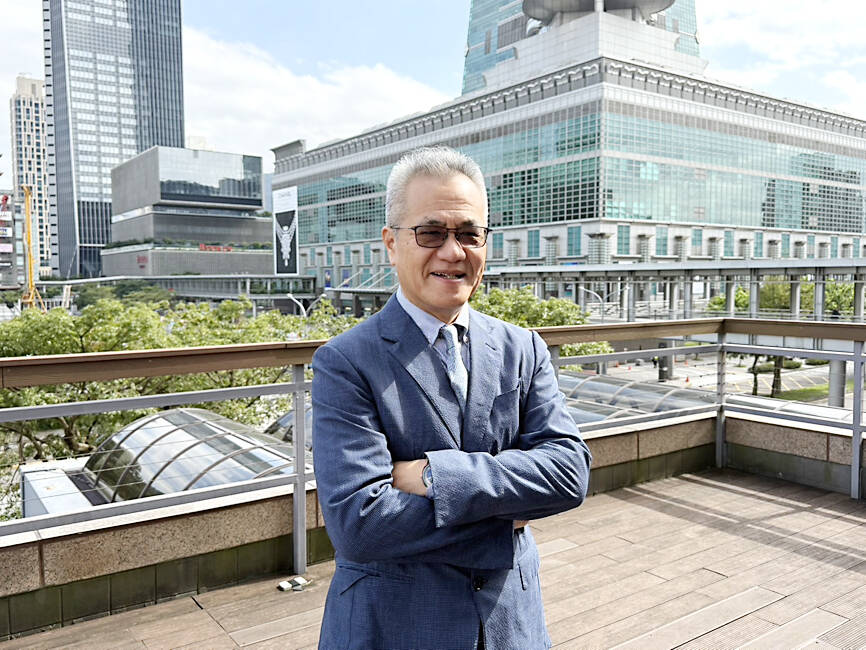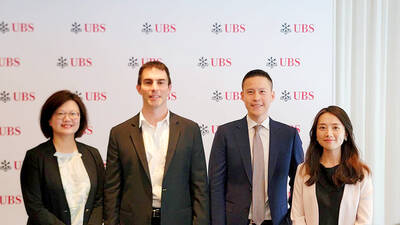WinWay Technology Co (穎崴), a chip testing interface supplier, yesterday said it aims to grow revenue by a double-digit percentage next year, thanks to rising demand for advanced testing services for artificial intelligence (AI) and high-performance computing (HPC) chips.
The AI boom has boosted demand for WinWay’s high-speed coaxial sockets, vertical probe cards and functional burn-in sockets this year, chairman Mark Wang (王嘉煌) said at a news conference in Taipei. A sizeable portion of the firm’s coaxial sockets and hyper sockets are used in HPC and AI chips.
WinWay’s revenue in the first 10 months of this year soared more than 50 percent year-on-year to NT$4.91 billion (US$151 million), the company said.

Photo: Grace Hung, Taipei Times
“The fourth-quarter orders received should push up our revenue this year to surpass the record hit in 2022,” Wang said. “We are optimistic about next year. We anticipate a double-digit percentage growth from this year.”
Since the lifecycle of AI chips is shrinking to about one year or one-and-a-half years, from two years in the past, such changes are stimulating demand for WinWay’s more complex testing services such as functional burn-in testing, Wang said.
As customer demand would be robust next year, WinWay plans to expand probe card capacity by about 50 percent, Wang said.
By the middle of next year, the company would see its probe card capacity surge to 4.5 million units a month, from 3 million units currently, he said.
Asked about potential impact of the imminent tariff hikes planned by US president-elect Donald Trump, Wang said it was hard to have a big picture yet.
However, the impact on WinWay should be very mild, as most of its direct customers are based in Taiwan, including foundry companies, chip packagers and chip testers, or their overseas operations in Southeast Asia, he said.
Only a small portion of its products are shipped to the US, he said.
WinWay has sales offices in the US and sees no urgent need to operate manufacturing facilities there, he added.
By region, North America made up about 61 percent of the company’s total revenue in the first three quarters of this year. Taiwan accounted for 24 percent.
WinWay is considering building one manufacturing facility in Malaysia over the next one to two years in response to customer demand for an alternative manufacturing site outside China and Taiwan, Wang said.
The company last year set up a sales and technology center in Penang, Malaysia, where Intel Corp and the world’s major chipmakers have operations, vice president Jason Chen (陳紹焜) said.
WinWay plans to establish a Malaysian subsidiary next year, as the country has become one of the world’s semiconductor hubs, given its robust growth of 7 percent in semiconductor production value over the past five years, he said.
The company reported that net profit in the first three quarters of this year more than doubled to NT$828 million from NT$406 million in the same period last year. That translated into earnings per share of NT$24.08, up from NT$11.84 a year earlier.

TECH TITAN: Pandemic-era demand for semiconductors turbocharged the nation’s GDP per capita to surpass South Korea’s, but it still remains half that of Singapore Taiwan is set to surpass South Korea this year in terms of wealth for the first time in more than two decades, marking a shift in Asia’s economic ranks made possible by the ascent of Taiwan Semiconductor Manufacturing Co (TSMC, 台積電). According to the latest forecasts released on Thursday by the central bank, Taiwan’s GDP is expected to expand 4.55 percent this year, a further upward revision from the 4.45 percent estimate made by the statistics bureau last month. The growth trajectory puts Taiwan on track to exceed South Korea’s GDP per capita — a key measure of living standards — a

Samsung Electronics Co shares jumped 4.47 percent yesterday after reports it has won approval from Nvidia Corp for the use of advanced high-bandwidth memory (HBM) chips, which marks a breakthrough for the South Korean technology leader. The stock closed at 83,500 won in Seoul, the highest since July 31 last year. Yesterday’s gain comes after local media, including the Korea Economic Daily, reported that Samsung’s 12-layer HBM3E product recently passed Nvidia’s qualification tests. That clears the components for use in the artificial intelligence (AI) accelerators essential to the training of AI models from ChatGPT to DeepSeek (深度求索), and finally allows Samsung

READY TO HELP: Should TSMC require assistance, the government would fully cooperate in helping to speed up the establishment of the Chiayi plant, an official said Taiwan Semiconductor Manufacturing Co (TSMC, 台積電) yesterday said its investment plans in Taiwan are “unchanged” amid speculation that the chipmaker might have suspended construction work on its second chip packaging plant in Chiayi County and plans to move equipment arranged for the plant to the US. The Chinese-language Economic Daily News reported earlier yesterday that TSMC had halted the construction of the chip packaging plant, which was scheduled to be completed next year and begin mass production in 2028. TSMC did not directly address whether construction of the plant had halted, but said its investment plans in Taiwan remain “unchanged.” The chipmaker started

LOOKING BRIGHT: Taiwanese tech stocks have been trading at 18 to 19 times earnings, beating the 15 percent long-term average amid AI-driven optimism, an analyst said Taiwan’s economy could expand by as much as 5 percent this year, fueled by its technology manufacturing edge amid a global artificial intelligence (AI) boom, while tariff exemptions on semiconductor products keep the country’s levy burden low despite a headline rate of 20 percent, UBS Investment Bank said yesterday. “Although Washington has imposed a 20 percent tariff on goods from Taiwan, exemptions for semiconductors keep the weighted average low,” UBS senior economist for Asia and China William Deng (鄧維慎) said. The growth momentum is expected to extend into next year, with technology companies’ revenue projected to rise 17 percent, UBS research head